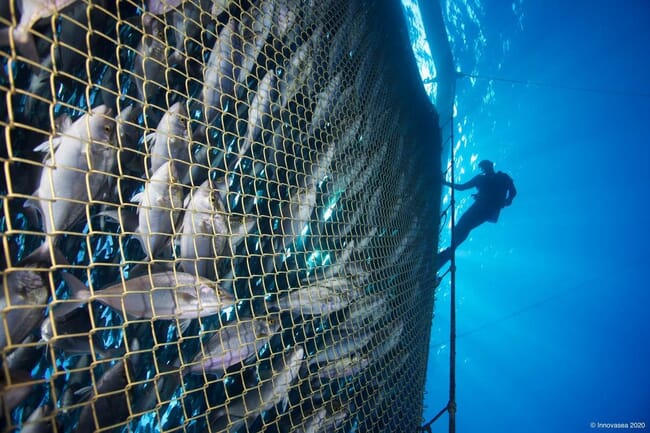
© Innovasea
In September Senators Roger Wicker, Brian Schatz and Marco Rubio introduced bipartisan legislation to advance American aquaculture development. The Advancing the Quality and Understanding of American Aquaculture (AQUAA) Act, which has companion legislation in the House, complements a recent executive order on seafood competitiveness and supports the development of an offshore aquaculture industry in US federal waters.
The letter, sent yesterday, argues for Congress to lend force to the draft legislation, stating that it will lead to economic improvements for both the country’s seafood and agriculture sectors, as well as increase food security.
The letter states that: “Congress has a unique opportunity to build an American seafood future that can bring us through this challenging time and support a diverse workforce, enhance sustainable ecosystems and guarantee healthful, locally-sourced protein for American consumers while providing opportunities for other US industries, including the agriculture industry, is a critical first step towards supporting sustainable marine aquaculture, and the future of US seafood production.
However, the authors continue, it is the regulatory vacuum that is principally holding the sector back.
“More than half of all seafood consumed today is farmed. While commercial fishing and wild harvest are and always will be an important part of the seafood supply chain, aquaculture is the fastest growing food production sector in the world and is responsible for nearly all global supply growth since the 1990s. But, at present, the US lags far behind the rest of the world in farmed seafood production. The single biggest reason for that is the lack of a clear regulatory pathway for permitting new projects, a challenging reality that has forced many American businesses to invest in other countries. To remedy these challenges, the AQUAA Act establishes a clear permitting process for US marine aquaculture that also prioritizes environmental and societal health. For example, AQUAA establishes National Standards for Sustainable Offshore Aquaculture which, like the National Standards for commercial fishing outlined in the Magnuson Stevens Act, are guiding principles for growing coastal economies, protecting ecosystems, and avoiding conflict among stakeholders.”
They add that concerns over the environmental impact of aquaculture are misplaced.
“AQUAA leverages modern siting and monitoring technologies to mitigate potential environmental impacts. It also provides for strict federal enforcement and includes a process for robust public input which ensures that coastal communities and states are considered prior to permitting new operations. In short, AQUAA provides much-needed regulatory certainty for US marine farmers while also preserving the environment, local economies, and public health. In addition to increasing our supply of healthful and sustainable American-raised seafood, growth of domestic aquaculture is an opportunity to revitalize the seafood industry which has been hard hit by the effects of Covid-19."
And they reiterate the wider economic benefits that could result from a thriving domestic aquaculture sector.
“As America begins to rebuild from the devastation of the Covid-19 pandemic, creating a new American seafood supply will have rippling effects throughout many areas of the country. Increased aquaculture production will lead to increased demand for American-grown crops, which can be used in plant-based fish feed, such as soybeans, corn and peas, will open up new markets to heartland farmers and lessen dependence on the uncertainty of foreign trade relationships.”
Finally they outline how Congress can support the bill.
“For the US to continue to expand the aquaculture industry and tap into the full economic potential that aquaculture can provide, Congress needs to further solidify the regulatory framework, provide clear guidance, and allocate additional funding through new legislation. We urge you to contact the sponsors of the AQUAA Act… to learn how this bill will help create jobs and drive sustainable, economic growth in your communities.”


